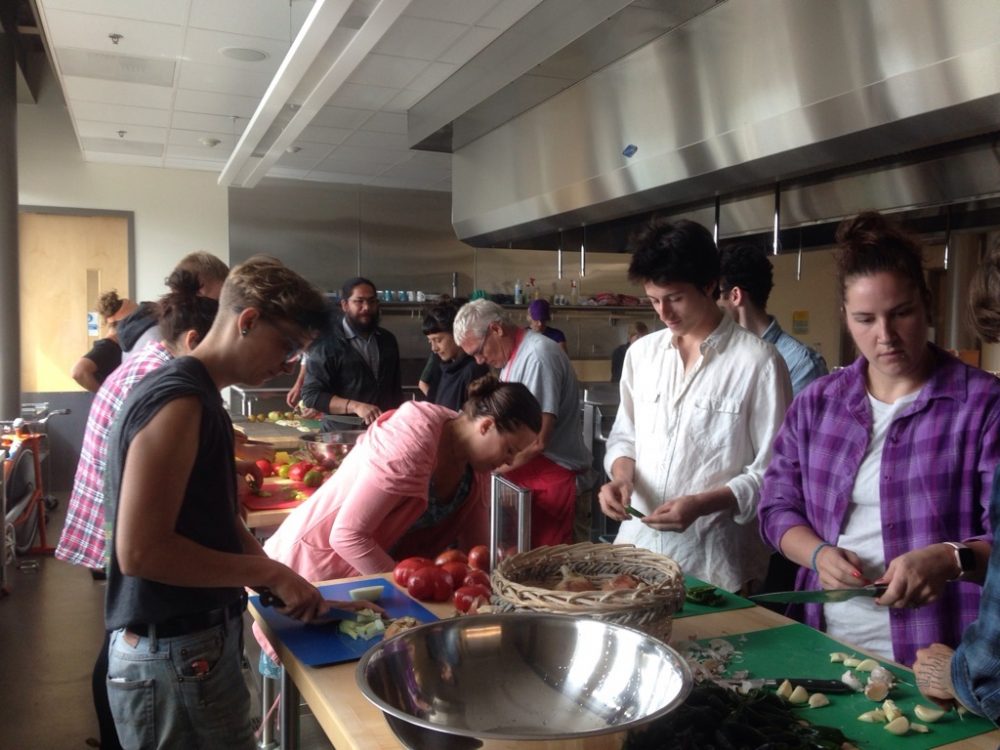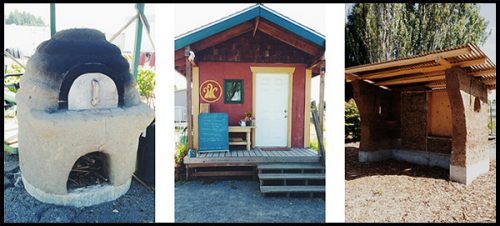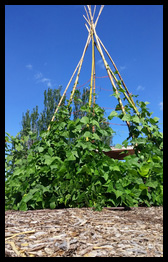Course Collaborations

“I love collaborating with the Learning Garden! The services that the staff provides really adds value to each of the health classes that I teach. Students appreciate the opportunities to learn more about how food is grown on campus and ways they can get more involved. From Loop Tours to Community-based Learning Garden projects, to class parties and even workshops in the food lab, the students receive a unique and memorable experience.”
Alissa Leavitt, MPH, MCHES, Faculty – Health Studies
“[PCC’s commitment to sustainability] really gives others a look at what can be achieved within a community with everyone working together and figuring out what is needed within the community. It gives the younger generation another approach to how we can get our food and resources and how we can come together as a community to better their food choices.”Student in HE250 Health Class
The Garden provides real-life context and application to concepts your students are learning in the classroom. Garden-based learning can be an asset to almost every discipline – from writing, language studies, science and math, to geography, anthropology, health, nutrition and business. The Rock Creek Learning Garden Coordinator is here to work with you to create customized lessons and activities that will engage students in relevant experiential learning right here on campus. Please contact us if you are interested in collaborating.
Current opportunities
- Community-Based Learning (CBL): We can serve as an on-campus site for your students to do a variety of service-based projects.
- Tour of the garden: The tour lasts approximately 45 min. – 1 hr and covers our small-scale food production systems. We can highlight any components relevant to your course.
- Work Party: We offer fun opportunities for students to learn more about sustainable agriculture through hands-on activities like planting, harvesting, weeding, and preparing garden beds. It is best to schedule at least 1 hour for volunteering with groups of 10 students or more.
To plan or schedule
Contact us with the information we ask for below:
- Have your students complete the photo and liability waiver
- We would like to meet with faculty prior to the start of having your students volunteering with us. From this meeting, we will be able to determine your needs and share ours. Please be prepared to share:
- Desired learning outcomes
- Project timeline
- Any concerns or anticipated challenges
- Number of students engaged
- Your expectations of the Learning Garden staff and their roles within the projects
Previous collaborations
Health & Nutrition on Campus
In the Fall of 2016, we partnered with a health class (HE20) to help students connect the dots between environmental and human health in our community. We led students in a sustainability loop tour to discuss health benefits of our sustainability and garden practices on campus, as well as a hands-on cooking class to learn how to prepare fresh vegetables (harvested straight from the garden) and why eating healthy benefits our bodies and our planet.
English for Speakers of Other Languages (ESOL) Community Engagement
After joining us for a Sustainability Loop tour, English language learners engage in at least six hours of volunteering in the garden as part of their class requirements! This helps them to engage in their community and practice speaking English while helping out in the garden.
Art in the Garden
A welding class in 2010 built art installations for the garden, others were donated by art students and faculty. View our full Art in the Garden brochure.
Building with Cob
 The Red Cob Shed and Welcome Kiosk were built by Alternative Building Design, Course 116, taught by Bernhard Masterson over the length of several terms. Cob is a sustainable building material made from straw, sand, and mud. In 2006, the Building Construction Department, under the supervision of Spencer Hinkle, built PCC Rock Creek’s first Earthen Oven. All have been great assets to the garden!
The Red Cob Shed and Welcome Kiosk were built by Alternative Building Design, Course 116, taught by Bernhard Masterson over the length of several terms. Cob is a sustainable building material made from straw, sand, and mud. In 2006, the Building Construction Department, under the supervision of Spencer Hinkle, built PCC Rock Creek’s first Earthen Oven. All have been great assets to the garden!
Food, Health, and Environment, HE 264, instructed by Alissa Leavitt
Students from the winter term 2015 completed Community-Based Learning assignments that focused on The Green Initiative Fund projects in the garden. These projects included the construction of raised beds in the hoop house, the installation of 8 new beehives, and the start-up of the farm stand.
English as a Second Language courses, instructed by Mike Bene
 We have two sections in the garden that were managed by ESOL 152, 254 during spring term 2015. Students, many of which had never gardened before, learned garden terms and practices, tool names, and were able to work together to construct a bean teepee.
We have two sections in the garden that were managed by ESOL 152, 254 during spring term 2015. Students, many of which had never gardened before, learned garden terms and practices, tool names, and were able to work together to construct a bean teepee.
GIS
Randy Morris’ Geographic Information Systems (GIS) class created a comprehensive map of the Learning Garden in 2015 for future use in the welcome kiosk built by Bernhard Masterson as well as for internal garden planning purposes.

